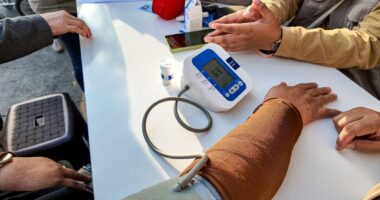Share this @internewscast.com
If you listen to the official narrative, you’ll hear it on repeat: drugs like Ozempic and Wegovy are not addictive.
They’re safe. They’re well-tolerated. And when used properly, they’re a valuable tool in treating obesity and type 2 diabetes.
But as an accredited nutritionist who works closely with women over 40, I’ve come to a different conclusion, not based on medical trials or Big Pharma PR, but from anxious emails, tearful consultations and silent shame women share behind closed doors.
What I’m seeing is a creeping psychological dependency.
Women are not just using Ozempic to lose weight. They are beginning to fear life without it. And for some, that fear becomes a form of captivity.
Over the past 18 months, an increasing number of my clients have either started using GLP-1 receptor agonists like semaglutide, or have come to me in distress after stopping.
Most weren’t obese; many were in perimenopause or menopause. They were exhausted by weight gain that seemed resistant to diet and exercise. They were promised relief from the relentless battle with food. And, for a while, they got it.

Nutritionist Faye James warns says women aren’t just losing weight on Ozempic – they are fearful of living without it, which is a form of psychological dependency
What happens when the hunger stops
Ozempic, and drugs like it, work by mimicking a gut hormone called GLP-1, which slows digestion, reduces appetite and sends powerful satiety signals to the brain.
Women describe it as ‘finally having an off switch’. For many, it’s the first time in years they have felt a sense of control around food.
One client told me, ‘It was like the volume knob on food had been turned right down. I could walk past a bakery and not even notice.’
This phenomenon has a name: it’s called ‘food noise’, the mental chatter that surrounds eating. The constant thoughts about what to eat, what not to eat, whether you’ve eaten too much, whether you should eat again.
For those who have spent decades dieting, bingeing, restricting or obsessing, the silence is euphoric. But that silence doesn’t last.
The crash no one warns you about
The real trouble begins when the prescription runs out. Or when side effects become intolerable. Or when cost becomes unsustainable.

Some semaglutide users are convinced microdosing prevents the visible gauntness associated with GLP-1 drugs, sometimes known as ‘Ozempic face’ (stock image of Ozempic injection pen)
In many cases, women stop not because they want to, but because they have to.
And then, the food noise returns. Only louder.
‘I was fine while I was on it,’ one woman told me. ‘But within weeks of stopping, I was starving all the time. I felt completely out of control.’
She gained back all the weight she had lost – and then some. ‘I wasn’t just hungry. I was panicked.’
Another client confided, ‘I felt like I was watching myself eat and couldn’t stop. It was terrifying. I keep calling my doctor begging to go back on it.’
These are not rare stories. I hear them weekly now.
And while pharmaceutical companies maintain that Ozempic is not addictive in the traditional sense, the reality is more complicated.
It may not trigger the same neurochemical pathways as nicotine, benzos or opioids, but it provides a sense of emotional relief, control and calm that is deeply seductive.
For women who have lived with food as a source of anxiety and shame, the drug becomes a lifeline.
Coming off it doesn’t just mean hunger returning. It means the loss of a psychological safety net and, in some cases, the return of lifelong patterns they thought they had escaped.
A new kind of dependence
What worries me most is that we are framing Ozempic as a tool to assist weight loss and facilitate exercise, when, for many, it is simply a quick-fix drug.
Yes, weight creeps back after stopping the drug because hunger returns. That’s simple biology. But what’s happening emotionally is far more profound. Women are reporting feelings of distress, helplessness, guilt and desperation. Some feel like failures. They don’t just miss the weight loss. They miss the peace.
This emotional reliance isn’t a byproduct of drug withdrawal. It speaks to how profoundly food, weight and identity are entangled, especially for women.
Many of the women I work with are intelligent, accomplished and thoughtful. They know numbers on the scale aren’t the most important thing, but they have spent a lifetime in a culture that praises thinness, punishes softness and judges appetite.
When a drug delivers a kind of peace, however artificial, it’s not hard to understand why coming off it feels unbearable.
And this is where we must ask the harder question: By relying on drugs like Ozempic, are we solving the problem, or sedating it?
The risks we’re not discussing

‘What worries me most is that we are framing Ozempic as a tool to assist weight loss and facilitate exercise, when, for many, it is simply a quick-fix drug,’ says nutritionist Faye James
Clinicians are rightly focused on the physical side effects of weight loss drugs – the nausea, fatigue, gastrointestinal issues, potential for muscle loss, malnutrition, gallstones and even pancreatitis.
But what we’re not discussing is the emotional side effects: the loss of trust in one’s body, the fear of appetite, the shame spiral when weight creeps back.
This is not an argument against Ozempic. Used responsibly, under medical supervision, it may serve a purpose for people with metabolic disease or diabetes.
But for the average woman who is simply trying to lose 10 or 15 kilos, it is far from a neutral intervention, and we must stop pretending otherwise.
This is not a gentle tool. It is a potent drug that alters your relationship with food, hunger and self-regulation. It removes choice. And when you stop, it doesn’t teach you how to eat without it; it teaches you that you can’t.
What should happen instead
If weight loss is the goal, the focus must shift from suppression to rebuilding metabolic and emotional resilience.
Food noise can be softened through stabilising blood sugar, improving gut health and increasing protein and fibre intake. But, more importantly, it can be addressed by healing the psychological relationship with eating.
That means:
- Eating regular meals built around protein, whole carbohydrates and healthy fats
- Avoiding extreme restriction or fasting protocols that spike hunger and cortisol
- Including complex carbohydrates at dinner to support serotonin and better sleep
- Eating enough. Chronic under-fuelling makes food obsession worse
- Addressing emotional drivers of eating through therapy or counselling
We must also stop pathologising hunger. Having an appetite is not a flaw. It is not something to fear; it is something to listen to, understand and respect.
When we teach women to outsource their hunger management to drugs, we are eroding trust in their bodies. And when they stop, they are left with nothing but noise.
This is not freedom.
Freedom is not being thin and terrified of food. It is not counting down until your next injection. It is not feeling like the only way to be in control is to be medicated.
True freedom is knowing how to eat in a way that nourishes, stabilises and sustains. It is understanding that food is not the enemy, and neither is your appetite.

Sharon Osbourne (seen in 2023) is an example of a celebrity known to take weight-loss jabs
The women I see are not failing – they are reacting to a system that promised relief but instead delivered dependency.
We are sleepwalking into a generation of women who will not know how to eat unless they are being chemically told not to. That is not health. And if we don’t start speaking honestly about it now, the long-term consequences will be far harder to fix.
Faye James is a Sydney-based nutritionist and author of The Perimenopause Plan, The Menopause Diet, The 10:10 Diet and The Long Life Plan.
She works with women over 40 to restore hormone health, metabolic balance and body confidence without restriction or medication dependency.












